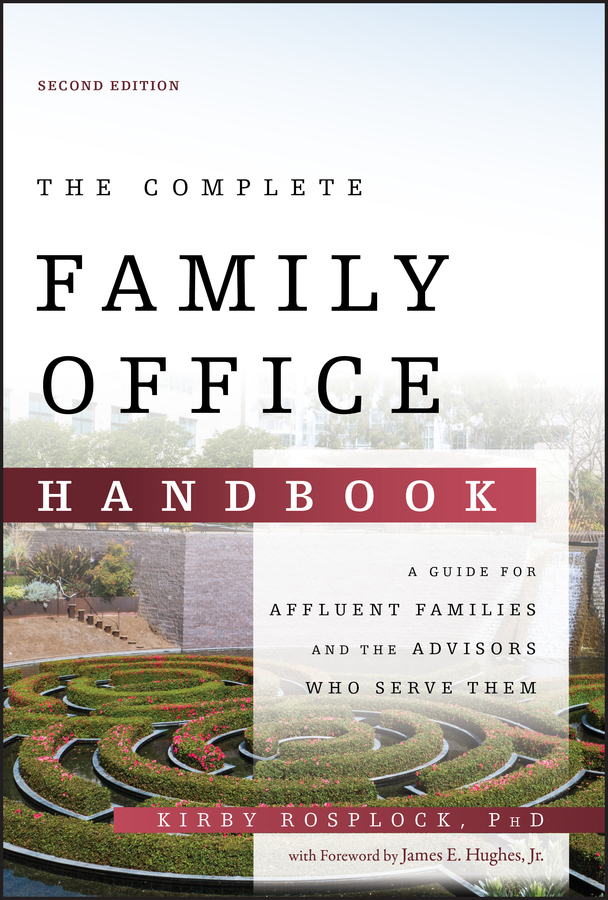Financial and Wealth Management in the Family Business
Beingness heavily concentrated in a single area and/or business organization is often the backstory to the creation of wealth in many family instances. Us Trust and Campden Research (i) conducted a longitudinal study on family unit part investing and establish that more than 70% of their sample identified that the source of the family unit wealth originated from the cadre family business, with 60% having an ongoing operating business.
Some 46% of the family offices surveyed had between $100 and $500 million in assets under management, and 57% were under x years of historic period. The study found that at that place appears to be an "operating visitor effect" whereby those families with operating companies are larger when it comes to assets under direction and number of staff, tend to be younger in age, serve fewer family members, straight their investing from in-house, and tend to exist more ambitious investors.
Further, those family offices connected to families with an operating company have lower family office cost structures, with high expectations that the function exist profitable. There may be something to be said regarding how a privately held business may establish an influence and expectation regarding the functioning, management, and function of a family part and its investment operation that outperforms its peers. Similar to the impact of an operating business organization on the family role, in that location is a paradigm when the investments go the new business (in the case of the investment office).

Attractions and challenges with embedded family offices
Information technology is simple to see why it would be convenient to accept family business and family wealth affairs managed within the family business. First, typically, y'all take long-tenured, trusted employees who take demonstrated responsibility, loyalty, skilful judgment and professionalism on behalf of the family business. 2nd, the business structure and cash period may be interconnected with the manor planning structures of individual family members. Family business organisation accountants and financial officers may have a strong understanding of these relationships. Third, the family business may house the records and legal documents involved, so confidential family information may exist readily accessible. Fourth, the family may not feel that a full-fourth dimension staffer is required to handle mainly administrative, organisational and investment tasks related to the family. These tend to be the primary motivators initially for keeping the wealth management affairs managed internally in the family concern. All the same, there are pregnant risks and reasons why extensive research by Family Part Substitution (FOX) has been done on the benefits of separating the family unit business from the management of the financial affairs of the family.
In detail, the demand for bifurcation of the business from the family wealth grows every bit the challenges of strapping family business employees with expanding responsibilities of the wealth put them in an increasingly compromised and conflicted position.
Beginning, an employee'south role may evolve and change to include responsibilities that present them with opportunities to know personal information such as social security numbers, account codes, and balances amongst other highly sensitive data like security codes to residences and passwords to safety deposit boxes. Admission to this private information becomes of heightened business, should an employee overstep their premises and employ the information to breach security of the family's avails. Further, this information could be used maliciously in such a way that could jeopardise a family'due south reputation, create jealousy, and/or worse however, nowadays blackmail possibilities for employees who are of a criminal persuasion.
The risks increment dramatically when scope creep occurs for family business employees at present tasked with treatment family office affairs; specially, when a family business employee is asked to besides manage personal financial affairs of one or more than family members. During a closed-door gathering of advisers and family office executives on risk direction best practices for the family business and family office, an adviser shared an instance where a family business employee, who was transitioned over to the family office, had so much access and all-encompassing knowledge of the personal affairs of the family that he blackmailed that family upon his retirement so that he could remain on the payroll.

This instance, albeit shocking, is rarely discussed or shared past families, but happens more than frequently than families may want to admit.
Farther, when families chore employees with management of financial and investment responsibilities, they may be in direct conflict with goals and objectives of the family business. This scenario happens quite oft, as family members may develop a rapport or connection with their accountant, fiscal function, and/or administrative staff in the family business and may at first brand minor, seemingly insignificant requests so increasingly make requests to handle personal affairs such as tape keeping, accounting, pecker pay, filing and administration, and dividend disbursements, amidst other mutual tasks. This tin pb to employees feeling pulled in opposite directions when or if the objectives of an individual family branch are not aligned with the family business objectives.
This is the quintessential example of when the family business employee becomes triangulated and faced with serving two equally important masters—the family business organisation and the individual family members. This is an eventual "lose–lose proposition" for the employee. The risks are that they fail to fulfil their role within the organisation to meet expected performance benchmarks and, equally dismal, they are unable to meet the family fellow member's expectation for support that is beyond their job description.
The family unit owners are conflicting with their employees who may have personal ties and deep respect for the family fellow member, and consequently practise not know how to say politely and respectfully, "I am unable to perform this function for you under my current job clarification and requirements." And, truth be told, the personal needs and requests from a family member may appear pocket-sized and insignificant at offset to the employee. Yet, compounded beyond years and increasing numbers of family members making those requests, before the employee knows it, she or he may be using x to 30% or more of his or her time on these extraneous tasks.
 Separating the family office from the family unit business organisation
Separating the family office from the family unit business organisation
There are also families with successful operating businesses, who intentionally create a carve up entity, such as a unmarried family office, to manage the wealth. They may task cardinal employees to shift functions from the day-to-day family business organization operations to oversee or manage the family office part. It is important to differentiate the evolution of this way of family function, as a family unit clearly views the need to bifurcate the responsibilities in a separate style from the management of the business. The decision to establish a separate dwelling house for the wealth to be managed and organised frequently is motivated past specific drivers, such as diversification of the assets across the concentrated scope of the family unit business organisation, tax efficiencies, or asset protection measures, for case.
In the instance of one family enterprise, at that place was a belongings company with a myriad of sub-companies underneath. The family was in the procedure of culling some of the underlying limited liability corporations in order to exit from certain marketplaces and to strategically focus on other core lines of business organization. Although the family could have redeployed those assets back into the operating businesses, they determined that their businesses did not demand additional capitalisation. Farther, the more senior members of the family were looking for means to garner liquidity for retirement, gifting, and legacy planning.
By redeploying the avails into a family unit office structure, individual shareholders were able to access upper-case letter, additional financial stability could be created for more senior family unit members, and the core family business organisation holding could exist diversified. Further, they were able to reduce their risk exposure of being completely convict in illiquid, privately held securities. They were additionally able to create a wealth management process and machinery for future liquidity events, so the planning, implementation, and execution of wealth management solutions for the family were less cumbersome.
Challenges establishing a family role separate from the family unit business organization also abound and not all families may be up for the task. Kickoff, families with a weak sense of family cohesion or affinity may accept greater difficulties enticing family members, who are or were shareholders of the family business to "double down" on their "familiness," or their sense of family belonging and togetherness, by managing their wealth together under a family office umbrella. Second, families with varying levels of fiscal wealth may likewise exist at odds to strike a residuum for establishing a family part.
_3.jpg) 1 family I have come up to know over the years faced this exact claiming when a portion of their business was sold, leaving them with several hundred million dollars of liquidity. They had certain branches of the family well-endowed through concentration of ownership over the decades, leaving 2-thirds of the wealth concentrated in one branch and the remainder split among several other branches. Compounding the gap of means, the wealth in the "have-nots" branch was farther fractionalised through dynasty trusts. As a result, the scale of wealth from the "haves" branch provided opportunities for more than complex investment structures and investment planning that simply was not of interest to the other branches. This divide of investment strategy, coupled with very unlike lifestyle and legacy planning, made the notion of forming a single family part to meet the needs of the broader family unit a pariah.
1 family I have come up to know over the years faced this exact claiming when a portion of their business was sold, leaving them with several hundred million dollars of liquidity. They had certain branches of the family well-endowed through concentration of ownership over the decades, leaving 2-thirds of the wealth concentrated in one branch and the remainder split among several other branches. Compounding the gap of means, the wealth in the "have-nots" branch was farther fractionalised through dynasty trusts. As a result, the scale of wealth from the "haves" branch provided opportunities for more than complex investment structures and investment planning that simply was not of interest to the other branches. This divide of investment strategy, coupled with very unlike lifestyle and legacy planning, made the notion of forming a single family part to meet the needs of the broader family unit a pariah.
(i) The US Trust/Campden Enquiry Due north America Family unit Part Study, presented to the Found for Individual Investors Winter Forum 2013, San Francisco, California.
Extracted with permission from The Complete Family Role Handbook: A Guide for Affluent Families and the Advisers Who Serve Them, 2nd Edition past Kirby Rosplock.
Source: https://www.campdenfb.com/article/what-impact-family-business-family-office
0 Response to "Financial and Wealth Management in the Family Business"
Post a Comment